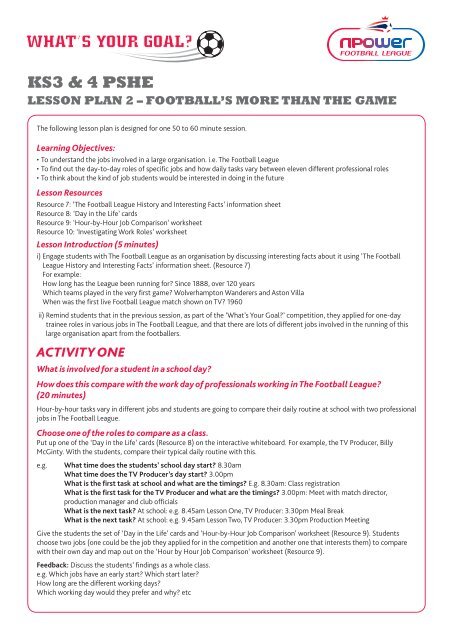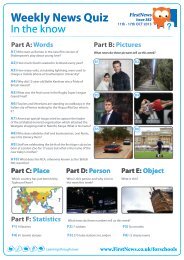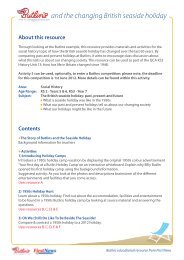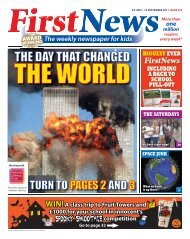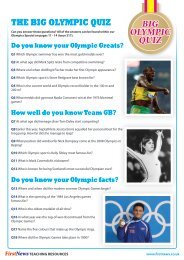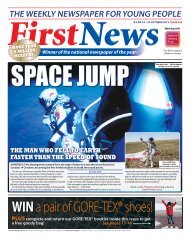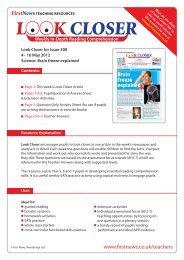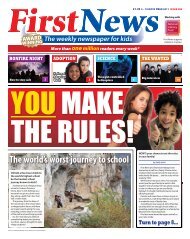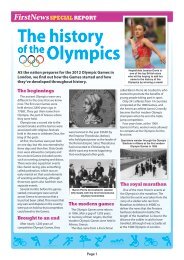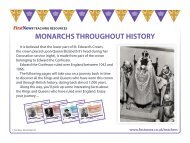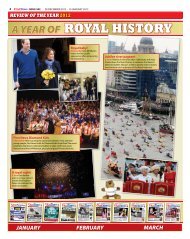ks3 & 4 pshe lesson plan 2 – football's more than the ... - First News
ks3 & 4 pshe lesson plan 2 – football's more than the ... - First News
ks3 & 4 pshe lesson plan 2 – football's more than the ... - First News
You also want an ePaper? Increase the reach of your titles
YUMPU automatically turns print PDFs into web optimized ePapers that Google loves.
KS3 & 4 PSHE<br />
LESSON PLAN 2 <strong>–</strong> FOOTBALL’S MORE THAN THE GAME<br />
The following <strong>lesson</strong> <strong>plan</strong> is designed for one 50 to 60 minute session.<br />
Learning Objectives:<br />
• To understand <strong>the</strong> jobs involved in a large organisation. i.e. The Football League<br />
• To find out <strong>the</strong> day-to-day roles of specific jobs and how daily tasks vary between eleven different professional roles<br />
• To think about <strong>the</strong> kind of job students would be interested in doing in <strong>the</strong> future<br />
Lesson Resources<br />
Resource 7: ‘The Football League History and Interesting Facts’ information sheet<br />
Resource 8: ‘Day in <strong>the</strong> Life’ cards<br />
Resource 9: ‘Hour-by-Hour Job Comparison’ worksheet<br />
Resource 10: ‘Investigating Work Roles’ worksheet<br />
Lesson Introduction (5 minutes)<br />
i) Engage students with The Football League as an organisation by discussing interesting facts about it using ‘The Football<br />
League History and Interesting Facts’ information sheet. (Resource 7)<br />
For example:<br />
How long has <strong>the</strong> League been running for? Since 1888, over 120 years<br />
Which teams played in <strong>the</strong> very first game? Wolverhampton Wanderers and Aston Villa<br />
When was <strong>the</strong> first live Football League match shown on TV? 1960<br />
ii) Remind students that in <strong>the</strong> previous session, as part of <strong>the</strong> ‘What’s Your Goal?’ competition, <strong>the</strong>y applied for one-day<br />
trainee roles in various jobs in The Football League, and that <strong>the</strong>re are lots of different jobs involved in <strong>the</strong> running of this<br />
large organisation apart from <strong>the</strong> footballers.<br />
ACTIVITY ONE<br />
What is involved for a student in a school day?<br />
How does this compare with <strong>the</strong> work day of professionals working in The Football League?<br />
(20 minutes)<br />
Hour-by-hour tasks vary in different jobs and students are going to compare <strong>the</strong>ir daily routine at school with two professional<br />
jobs in The Football League.<br />
Choose one of <strong>the</strong> roles to compare as a class.<br />
Put up one of <strong>the</strong> ‘Day in <strong>the</strong> Life’ cards (Resource 8) on <strong>the</strong> interactive whiteboard. For example, <strong>the</strong> TV Producer, Billy<br />
McGinty. With <strong>the</strong> students, compare <strong>the</strong>ir typical daily routine with this.<br />
e.g.<br />
What time does <strong>the</strong> students’ school day start? 8.30am<br />
What time does <strong>the</strong> TV Producer’s day start? 3.00pm<br />
What is <strong>the</strong> first task at school and what are <strong>the</strong> timings? E.g. 8.30am: Class registration<br />
What is <strong>the</strong> first task for <strong>the</strong> TV Producer and what are <strong>the</strong> timings? 3.00pm: Meet with match director,<br />
production manager and club officials<br />
What is <strong>the</strong> next task? At school: e.g. 8.45am Lesson One, TV Producer: 3.30pm Meal Break<br />
What is <strong>the</strong> next task? At school: e.g. 9.45am Lesson Two, TV Producer: 3.30pm Production Meeting<br />
Give <strong>the</strong> students <strong>the</strong> set of ‘Day in <strong>the</strong> Life’ cards and ‘Hour-by-Hour Job Comparison’ worksheet (Resource 9). Students<br />
choose two jobs (one could be <strong>the</strong> job <strong>the</strong>y applied for in <strong>the</strong> competition and ano<strong>the</strong>r one that interests <strong>the</strong>m) to compare<br />
with <strong>the</strong>ir own day and map out on <strong>the</strong> ‘Hour by Hour Job Comparison’ worksheet (Resource 9).<br />
Feedback: Discuss <strong>the</strong> students’ findings as a whole class.<br />
e.g. Which jobs have an early start? Which start later?<br />
How long are <strong>the</strong> different working days?<br />
Which working day would <strong>the</strong>y prefer and why? etc
ACTIVITY TWO<br />
Investigating working environments and daily tasks involved in different jobs and how <strong>the</strong>se vary<br />
from role to role (20 minutes)<br />
In this activity students use <strong>the</strong> ‘Day in <strong>the</strong> Life’ cards (Resource 8) to compare <strong>the</strong> working environments and tasks involved<br />
in different jobs. Again, choose one role to study as a class and put up on <strong>the</strong> whiteboard, for example, TV Producer.<br />
Can you name <strong>the</strong> different places in which a TV Producer could work?<br />
(As well as using <strong>the</strong> ‘Day in <strong>the</strong> Life’ cards to find information and ask students to think about where this person would work<br />
on non-match days.)<br />
• Football stadiums around <strong>the</strong> UK<br />
• Outside Broadcast Trucks<br />
• TV Offices<br />
Which different groups of people does this person have to work with?<br />
• match director, production manager, production team, cameramen, technical crew, engineers, presenters, directors, video<br />
tape department<br />
What different tasks are involved in this role?<br />
• <strong>plan</strong>ning meetings, equipment checks, rehearsals, deciding which pre-recorded items to include or drop, watching football<br />
action to <strong>plan</strong> for half-time and post-match discussions<br />
Is <strong>the</strong>re a uniform or dress-code for this job?<br />
• Although <strong>the</strong>re is no uniform for a TV producer, in this role you meets lot of different people throughout <strong>the</strong> working day,<br />
<strong>the</strong>refore <strong>the</strong>y would need to be reasonably smart.<br />
What most interests you about this job?<br />
• e.g It would be exciting working with lots of different groups of people and solving problems on <strong>the</strong> spot in order to create a<br />
TV programme<br />
Students investigate four o<strong>the</strong>r jobs using <strong>the</strong> ‘Day in <strong>the</strong> Life’ cards and record <strong>the</strong>ir findings on <strong>the</strong> ‘Investigating Work Roles’<br />
worksheet (Resource 10 - this worksheet will need to be photocopied double-sided).<br />
Plenary (5 <strong>–</strong> 10 minutes)<br />
Discuss with <strong>the</strong> students what <strong>the</strong>y have found out, and compare and contrast <strong>the</strong> different jobs.<br />
e.g<br />
Which jobs involve having meetings and what are <strong>the</strong> meetings for?<br />
Which jobs are <strong>more</strong> office based?<br />
Which roles involve working with lots of people?<br />
Which jobs use <strong>more</strong> technology?<br />
Discuss <strong>the</strong> working environments and variety of tasks <strong>the</strong> students would like in <strong>the</strong>ir future career. Can <strong>the</strong>y identify<br />
which of <strong>the</strong> eleven job roles <strong>the</strong>y think would be suitable for o<strong>the</strong>r students in <strong>the</strong> class and explain <strong>the</strong>ir reasons for <strong>the</strong>se<br />
suggestions?


